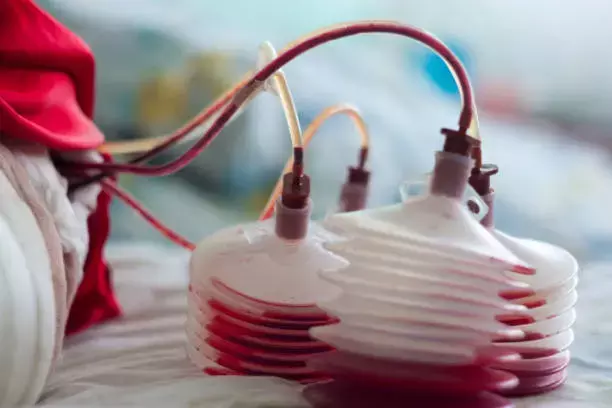- Home
- Medical news & Guidelines
- Anesthesiology
- Cardiology and CTVS
- Critical Care
- Dentistry
- Dermatology
- Diabetes and Endocrinology
- ENT
- Gastroenterology
- Medicine
- Nephrology
- Neurology
- Obstretics-Gynaecology
- Oncology
- Ophthalmology
- Orthopaedics
- Pediatrics-Neonatology
- Psychiatry
- Pulmonology
- Radiology
- Surgery
- Urology
- Laboratory Medicine
- Diet
- Nursing
- Paramedical
- Physiotherapy
- Health news
- Fact Check
- Bone Health Fact Check
- Brain Health Fact Check
- Cancer Related Fact Check
- Child Care Fact Check
- Dental and oral health fact check
- Diabetes and metabolic health fact check
- Diet and Nutrition Fact Check
- Eye and ENT Care Fact Check
- Fitness fact check
- Gut health fact check
- Heart health fact check
- Kidney health fact check
- Medical education fact check
- Men's health fact check
- Respiratory fact check
- Skin and hair care fact check
- Vaccine and Immunization fact check
- Women's health fact check
- AYUSH
- State News
- Andaman and Nicobar Islands
- Andhra Pradesh
- Arunachal Pradesh
- Assam
- Bihar
- Chandigarh
- Chattisgarh
- Dadra and Nagar Haveli
- Daman and Diu
- Delhi
- Goa
- Gujarat
- Haryana
- Himachal Pradesh
- Jammu & Kashmir
- Jharkhand
- Karnataka
- Kerala
- Ladakh
- Lakshadweep
- Madhya Pradesh
- Maharashtra
- Manipur
- Meghalaya
- Mizoram
- Nagaland
- Odisha
- Puducherry
- Punjab
- Rajasthan
- Sikkim
- Tamil Nadu
- Telangana
- Tripura
- Uttar Pradesh
- Uttrakhand
- West Bengal
- Medical Education
- Industry
Use of suction drainage in TKA associated with increased blood loss: study

Total knee arthroplasty is a commonly performed procedure with postoperative complications including blood loss, pain, and hematoma formation. The role of intra-articular drainage in reducing these complications remains controversial.
Alessandro Smimmo et al conducted a study to evaluate the effects of intra-articular drainage on hemoglobin levels, pain, hematoma formation, and the need for blood transfusion in patients undergoing knee replacement.
A prospective study was conducted on 60 patients divided into two groups: Drainage (D) and No Drainage (ND). Hemoglobin levels, pain scores, ultrasound evaluation of intra-articular hematoma, and transfusion rates were recorded on the first, third, and fifth postoperative days. The estimated blood loss was calculated using the Meunier formula. Pain was evaluated using the Visual Analog Scale, while hematoma size was measured using ultrasound.
Key findings of the study were:
• The postoperative hemoglobin drop was significantly higher in the D group (p = 0.0027), with a mean estimated blood loss of 1366 mL in the D group compared to 957 mL in the ND group.
• Four patients in the D group required blood transfusions, while none in the ND group did (p = 0.0003).
• Pain scores were lower in the D group on the first postoperative day (p = 0.0001), but no significant differences were observed on the third and fifth days.
• Ultrasound showed a larger hematoma in the ND group on the first postoperative day (p = 0.02), but no significant difference was found by the fifth day.
The authors concluded that – “The use of drainage in TKA is associated with increased blood loss and transfusion rates without providing long term clinical benefits. While it may offer temporary pain relief and reduce early hematoma formation, its routine application should be reconsidered given the potential for increased postoperative anemia and patient discomfort, along with the lack of sustained pain reduction. Surgeons should carefully weigh its short-term benefits against its risks, particularly in patients with pre-existing anemia or those at risk for significant blood loss.”
Further reading:
Clinic and Ultrasound Evaluation of Suction Drainage in Total Knee Arthroplasty Procedure: A Multicentric Prospective Trial Alessandro Smimmo et al Indian Journal of Orthopaedics https://doi.org/10.1007/s43465-025-01501-7
MBBS, Dip. Ortho, DNB ortho, MNAMS
Dr Supreeth D R (MBBS, Dip. Ortho, DNB ortho, MNAMS) is a practicing orthopedician with interest in medical research and publishing articles. He completed MBBS from mysore medical college, dip ortho from Trivandrum medical college and sec. DNB from Manipal Hospital, Bengaluru. He has expirence of 7years in the field of orthopedics. He has presented scientific papers & posters in various state, national and international conferences. His interest in writing articles lead the way to join medical dialogues. He can be contacted at editorial@medicaldialogues.in.


